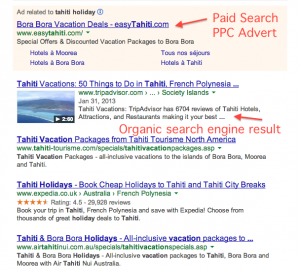Pay per click advertising is also known as PPC or ‘paid search’ advertising. It’s more than just advertising on Google… despite it’s prominent use in online advertising strategies it is actually not very well understood and continues to be confused with search engine optimisation or display advertising options. Don’t know what SEO stands for? Check out part three of this online series where we outline search engine optimisation and what it can do for your business.
How is PPC different to SEO?
PPC advertising differs from search engine optimisation in that every view or click of the information about the business is paid for. PPC ads are typically displayed with a coloured background at the top or at the side of the organic (natural) search results. Here is an example of PPC done by someone using Google Adwords management.

PPC advertising is effective because it targets consumers already looking for your products or services. When an advertisement is displayed next to organic results, many searchers do not actually know the difference; that is why many businesses choose to advertise on Google rather than attempt an SEO campaign. The benefit to an SEO campaign is that the ranking is still there even if the advertising budgets are not.
How does PPC work?
- Write the advertisement
Most ads have room for 1-2 sentences. The best advertisements use these sentences to grab the attention of the audience and cause them to click. In some ads, like those on Facebook, the advertiser can also choose a picture to go along with the ad. - Choose your target audience / keywords
Each platform offering PPC advertising offers different ways to narrow down the audience to which you will display your advertisement. Google typically offers keywords and location. Facebook allows advertisers to use ‘likes’, keywords on a page, people they are friends with, location and even sociographic profiling to select the most effective audience. - Make a Bid
Advertisers select whether they want to pay per view (the number of times the ad is shown) or whether they want to pay per click (the number of times the ad is clicked on). The most typical is pay per click because it ensures that money is being spent on people actually interested in the product.
Because PPC advertisements are so fluid, the price per click or view is actually set by the advertiser. If other advertisers bid more, the ad is less likely to show. If you set a high price to pay per click, the ad is more likely to show up and in a more prominent position. - Set the budget
One you have confirmed how much you are willing to pay, the PPC campaign will run according to whatever daily budget you give it. For instance, one the ad has received enough clicks to reach the budget of $20, the ad will stop showing up. In this way, advertisers can manage their costs. - Monitor
Getting a lot of clicks (and paying for them!) is only good if those clicks turn into sales. The final step in any PPC advertising campaign is always to check how it is affecting your sales.
What are the key ingredients to effective PPC?
- Setting target audience
You need to show your advertisement to the right people or it won’t be clicked on. Or worse, it will be clicked on (so you have to pay for it) but they won’t buy from you. - Choosing keywords
Some keywords are really competitive and difficult to get featured in good positions. Other keywords never have anyone use them so setting up an advertisement is useless. The right keywords will get you in front of someone looking for your particular service or product in your location. - Setting appropriate bids and budgets
The bid amount needs to be competitive enough to get your PPC advertisement shown but not so high that you lose money because of the number of people clicking on it. - Writing the advertisement
Getting the attention of your customers is key with proper wording. This is where split testing is helpful to see which advertisement your customers respond to the most. - Monitoring and adjusting
At the end of the day it’s all about sales. Are your advertisements bringing in revenue? Only monitoring the results and continually adjusting until you find the right formula will bring success.
As you can see there’s a lot of factors to take into account for effective pay per click management. This is why most people contract in a pay per click company who provide pay per click services. They have spent many hours and have many tools in their belt to streamline the process and get real results faster.
Help! I need someone to design a Pay Per Click campaign for my business.
Stay tuned for the next article in our Online Marketing series covering Email Marketing and Blogs.



